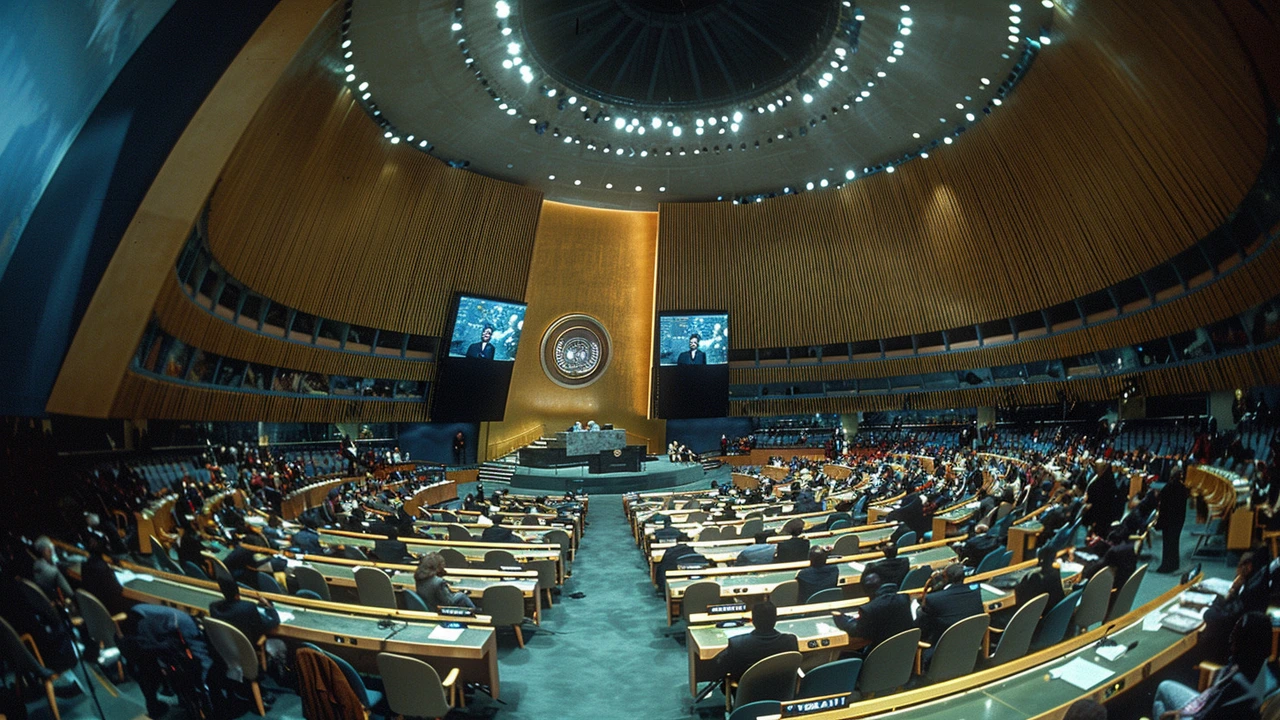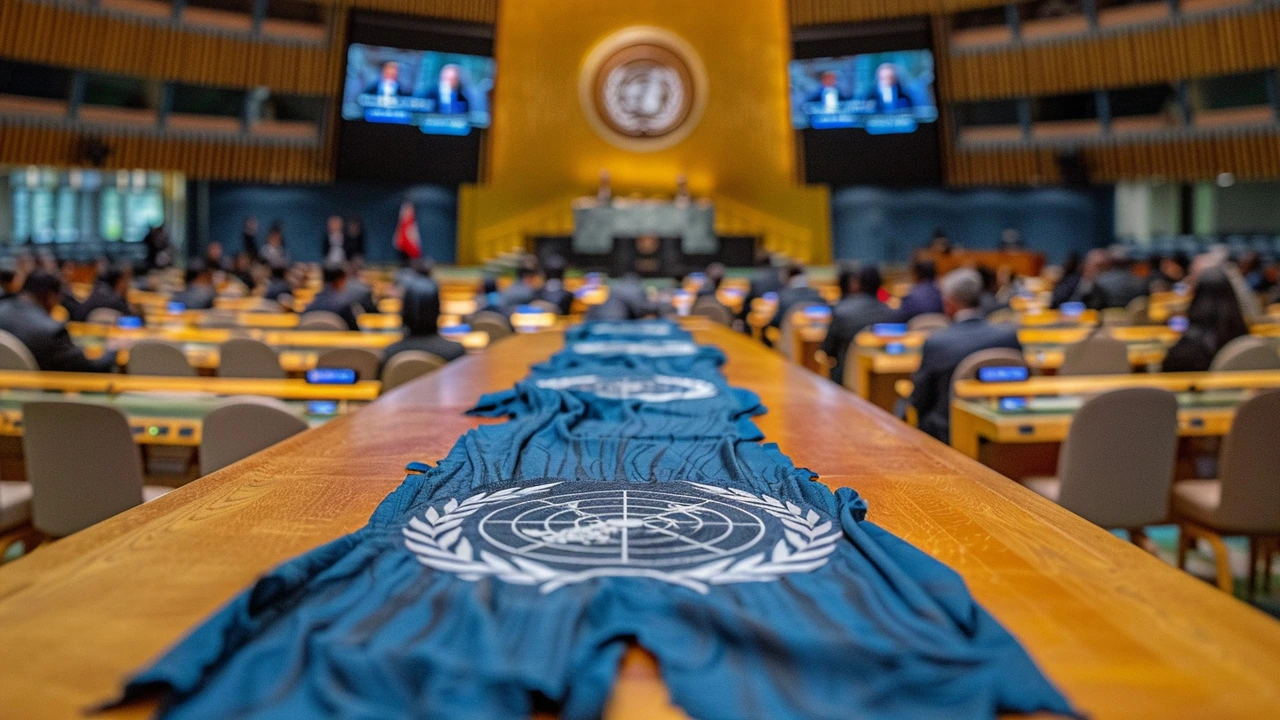UN Security Council Convenes Emergency Meeting After Deadly Rafah Strike
The United Nations Security Council is set to gather for an emergency session in response to the recent Israeli airstrike on Rafah, a city in the southern Gaza Strip. The strike targeted Hamas operatives but resulted in a devastating fire that swept through a nearby displaced persons camp, leading to the deaths of 45 people, many of whom were civilians. According to health officials in Gaza, who are managed by Hamas, the tragic outcome has garnered widespread international condemnation, describing the strike as a 'massacre'.
The incident has prompted an outpouring of grief and anger from various global leaders and organizations. UN Secretary-General Antonio Guterres and the UN's humanitarian chief, Martin Griffiths, have both strongly condemned the attack. Griffiths went as far as calling it 'utterly unacceptable,' reflecting the severity of the international community’s reaction. The European Union’s foreign policy chief, along with French President Emmanuel Macron and a spokesperson from the US National Security Council, have also expressed their horror and disgust, urging Israel to take all necessary precautions to avoid civilian casualties.
Investigations and Political Repercussions
In response to the mounting pressure, the Israeli military has announced an investigation into the circumstances surrounding the strike. Israeli Prime Minister Benjamin Netanyahu has expressed that the deaths occurred despite Israel's efforts to protect civilian lives in the densely populated region of Gaza. Netanyahu insisted that the strike was aimed at eliminating Hamas operatives who pose a threat, and any civilian casualties were an unfortunate result of the ongoing conflict.
Adding to the complexity of the situation is the diplomatic fallout from the incident. Spain, Ireland, and Norway have announced their intentions to formally recognize the state of Palestine, a move that Israel has vehemently opposed, describing it as a 'reward' for Hamas's actions. The foreign ministers of these countries argue that recognizing Palestine is a matter of justice and necessary for achieving peace in the region. In retaliation, Israel has decided to cease consular services to Palestinians in the West Bank starting from June 1, further escalating tensions.
Historical Context and Current Situation
The situation in Gaza remains highly volatile. The current wave of violence started after a brutal attack by Hamas on southern Israel on October 7, which resulted in the deaths of 1,200 people and the abduction of 252 hostages. This incident sparked a fierce retaliatory response from Israel, leading to a significant escalation in hostilities between the two sides.
The Rafah strike stands as a sobering reminder of the human cost of this long-standing conflict. Civilian areas, often crowded and lacking adequate shelters, become tragic epicenters of destruction and loss. The international community continues to call for de-escalation and emphasizes the importance of humanitarian considerations in warfare.
Beyond the immediate political and military ramifications, the humanitarian crisis in Gaza is dire. The region, already suffering from decades of conflict, blockade, and economic decline, faces enormous challenges. Access to basic necessities such as clean water, healthcare, and sufficient shelter is severely limited, further compounded by the recent violence.

Global Reactions and Humanitarian Concerns
The international reaction to the Rafah strike has been swift and severe. Leaders from around the globe have issued statements denouncing the attack and calling for accountability. The EU's foreign policy chief stressed the need for an immediate ceasefire and the formation of corridors for humanitarian aid. French President Macron described the incident as a stark violation of international law, urging for an independent investigation to hold those responsible to account. Meanwhile, a spokesperson for the US National Security Council reiterated the call for Israel to safeguard civilian lives and adhere strictly to international humanitarian standards.
Humanitarian organizations on the ground have been overwhelmed by the scale and intensity of the recent violence. Aid workers strive tirelessly to provide relief despite the dangers they face in such a high-risk environment. Efforts to deliver aid and medical supplies have been hampered by ongoing military operations, further exacerbating the humanitarian situation.
The Rafah incident, like many others, illustrates the profound need for a comprehensive and lasting solution to the Israeli-Palestinian conflict. As calls for peace and justice echo globally, the path to a sustainable resolution appears increasingly complex. Yet, the international community’s outcry signals a collective yearning for an end to the bloodshed and a renewed commitment to protecting the rights and lives of all civilians caught in the crossfire.
Conclusion
As the UN Security Council meets to address the Rafah strike, the eyes of the world are closely watching. The humanitarian implications, combined with the political repercussions, make this a pivotal moment in the ongoing conflict. The hope is that through dialogue and cooperation, a path to peace and stability can be forged, bringing an end to the cycles of violence that have plagued the region for so long.
Only time will tell if the outpouring of international outrage will translate into tangible action and meaningful change. For now, the memories of those lost in the Rafah strike serve as a solemn reminder of the urgent need for a more peaceful and just world.

Karthik Nadig
May 28, 2024 AT 18:50They’re using the Rafah strike as a smokescreen for the global agenda to weaken India’s allies! 🌍🔥 The mainstream media won’t tell you who’s really pulling the strings, but the pattern is obvious – it’s all about diverting attention from the real power plays happening behind the scenes. Keep your eyes open, folks! 😤
Charlotte Hewitt
May 28, 2024 AT 19:40Exactly, the whole UN emergency meeting is just a puppet show staged by the elite to keep us distracted while they tighten the chokehold on our freedoms. They love throwing around ‘humanitarian’ buzzwords while the real plan is to shift the narrative and keep the West‑Bank under tighter control. It’s all a circus, mate.
Jane Vasquez
May 28, 2024 AT 20:46Oh sure, another excuse for endless war, 🙄
Hartwell Moshier
May 28, 2024 AT 22:26It is a sad thing that people die i the war and we need to help them
Jay Bould
May 29, 2024 AT 00:23Hey everyone, just wanted to share a bit of perspective on the Rafah tragedy and why it matters to all of us, no matter where we’re from. First off, the loss of civilian lives in a densely populated camp is a stark reminder that conflict doesn’t just stay on a map – it reaches into families, homes, and everyday routines. The people of Gaza have been living under a blockade for years, which has made even basic things like clean water and electricity a daily struggle. When a strike hits a displaced‑persons camp, the impact ripples far beyond the immediate casualties; it deepens the humanitarian crisis that has been simmering for decades. International law is clear about the protection of civilians, and each loss chips away at the credibility of the institutions meant to enforce those rules. Moreover, the emotional toll on survivors – the trauma, the grief, the fear of future attacks – can last generations, creating cycles of resentment and retaliation. It’s also worth noting that the global response, from UN meetings to public statements, can shape the future political landscape. When world leaders collectively condemn such actions, it sends a signal that mass civilian harm won’t be tolerated. Yet, words need to be followed by concrete measures: access corridors for aid, independent investigations, and a genuine push for a ceasefire. In the longer view, a stable and peaceful resolution benefits not just the region, but also global security and economic stability. The more we understand the humanity behind the headlines, the better we can advocate for policies that prioritize lives over politics. So, let’s keep the conversation going, stay informed, and support organizations that are on the ground delivering aid and documenting facts. Together, we can help turn outrage into action and, hopefully, into lasting change.